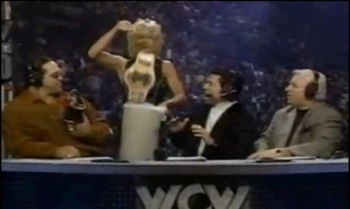During my time studying in the University of Toronto at Scarborough’s Dramatic Arts program, I incorporated professional wrestling in my projects and final essays quite regularly. From the collaboration of the different performing arts in WWE’s productions, to the analysis of lyrics of Mr. McMahon’s theme music, wrestling has not only entertained me, but helped me get my degree. Therefore, I present to you this series of articles combining the extraordinary worlds of 1) faith in Jesus Christ and 2) professional wrestling in series called:
Wrestling With Faith
Part 1: The Father Sacrifices The Son
In the life of Christian, whether you are Catholic, Orthodox, or Protestant, the seminal moment in human history is the death and resurrection of Jesus Christ. In a spiritual and religious sense, it opened up the possibilities of salvation and eternal life that would not have been had Christ not redeemed us. In the natural world, human history has changed so much since that Passover weekend that modern society would not be the way it is today.
Similarly, in the wild, crazy, cartoonish, beautiful world of wrestling that I continue to love and delve into, wrestling’s seminal moment occurred at the 1997 iteration of the World Wrestling Federation’s Survivor Series, which went down in history for the infamous Montreal Screwjob. This is the moment that not only set the stage for the WWE to win out over its competition, WCW, but also contributed to the proliferation and continuation of professional wrestling to the level it is today.

Vincent Kennedy McMahon’s WWF (now WWE) is the continuation of his family’s business. Beginning in 1915, Roderick James McMahon began promoting wrestling in the “Promised Land” of entertainment, New York City. His son, Vincent Jess McMahon continued the business, and created the company that his son operates today. Though Vince Senior preferred to keep wrestling to the niche of the Northeast United States, the younger Vince had a vision to make wrestling a global phenomenon, and he succeeded in doing that with his own Elijah: Terry Bollea, who portrayed a clean, all-American hero who trained hard, took his vitamins, and said his prayers named Hulk Hogan. Thanks to the success of Hulk Hogan and the supercard event Wrestlemania, WWF stood atop the wrestling world and was a pop culture fixture. WWF would hold on to this status unopposed for years, until September 4, 1995, when World Championship Wrestling, run by Eric Bischoff and bankrolled by Ted Turner began, direct competition with their Monday Nitro wrestling show, beginning the Monday Night War.
Initially beginning operations in 1970 as Georgia Championship Wrestling, WCW acted as the Roman Empire swooping in and taking over territory that had been in control for years by a group that predated them. WCW Monday Nitro had been scoring major ratings victories against WWF Monday Night RAW. Focusing on less cartoonish storylines, and sparked by the shocking heel turn by former WWF hero Hulk Hogan, WCW had overtaken WWF as the largest wrestling promotion in the world. WCW sought to steal away WWE’s talents, market and ultimately run them out of business.

Along with financial difficulties brought by the success of WCW, McMahon and his promotion already suffered a great humiliation when his own Women’s Champion, Alundra Blayze secretly defected to WCW, taking the championship belt with her, and, under her new boss’s influence, literally threw her title in the trash on live, international TV. Fearing the same could happen with the men’s championship, held by a departing Bret “Hitman” Hart, McMahon changed the ending of the main event match of Survivor Series, which would have seen Hart retain the belt due to his opponent, “Heartbreak Kid” Shawn Michaels getting disqualified. This was done without Hart’s prior knowledge. As Judas’s betrayal of Jesus Christ set the wheels in motion for the salvation of humanity, the death of Bret Hart’s WWE wrestling career, in hindsight, saved wrestling from becoming just a blip in the pop culture machine.
Christ’s willing and perfect sacrifice contrasts with Hart’s unintended and manipulated sacrifice. The father and high priest of the modern wrestling industry allowed the son of Canadian wrestling royalty to be sacrificed: One man for the sake of the many. After the arena cleared and the production crew were taking apart the set, Bret and many of his colleagues in WWF and other companies asked themselves why Vince had forsaken him. Locking himself in his office, Vince McMahon was unwilling to face Hart after what had happened. However, the spirit (and leader) of the WWE locker room, The Undertaker, convinced Vince to meet with Bret. No one outside of Bret and Vince really knows exactly what happened, but McMahon held an interview with Jim Ross on RAW the next night sporting a pretty fresh black eye. And with the words “Bret screwed Bret,” Vince McMahon set the wheels in motion for one of the greatest heels professional wrestling had ever seen: himself.

The evil, tyrannical, megalomaniac “Mr. McMahon” character was born. And with this character, the Vince the man would use that heat and momentum to carry the WWF into the new era, with the two biggest wrestling superstars the world would ever see.
Thanks for reading! In Part Two of “Wrestling With Faith,” just like Sts. Peter and Paul began the initial boom in evangelization, Stone Cold Steve Austin and The Rock grow the WWE’s wrestling audience with a fervour that the world had never seen before.

